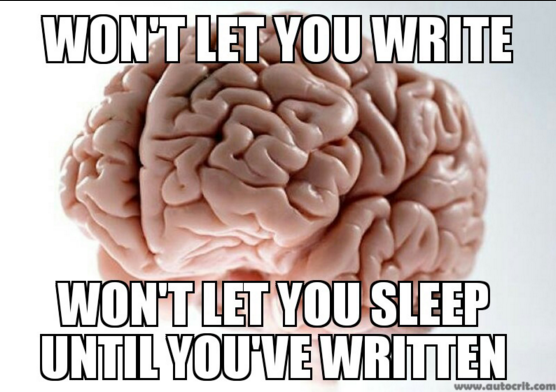

Being a writer is the best job in the world, aside from those fortunate enough to be paid to pet kittens or sample new ice cream flavors. But is writing a REAL job? This question has set fire to the entire psychiatric community. Okay, most of them…the ones in my head *turns off fire alarms*.
Many in our modern culture don’t believe writing qualifies as a legitimate occupation. An unusual percentage of ‘average’ citizens firmly maintain that being a writer is NOT a real job. These same individuals, however, collectively spend billions of dollars and most of their free time enjoying entertainment (created by writers).
Cleaning Teeth= ‘Real’ Job
Writing= Goofing Off
Thus far, those interviewed have yet to note the irony of their assertions (or looked up definition of irony). Since being a writer is not a ‘real job,’ then this leads us to the next most reasonable conclusion. Writing, in truth, may be a mental condition. I have written about the 13 Ways Writers Are Mistaken for Serial Killers.
So there IS that…
Today is Friday, and since we all debated Sean Penn’s book in the comments section on my last post (Was he serious or poking fun at the establishment?), I figured this oldie but goodie was the perfect dash of humor to lead y’all into the weekend…
What IS Terminological Inexactitude Syndrome (T.I.S.)?


Tis’ a hard diagnosis for certain. Alas, Terminological Inexactitude Syndrome is a compulsive need to tell stories. We call those afflicted a ‘writer’ namely because ‘writer’ is shorter than ‘Terminological Inexactitude Syndrome.’ Also, those who used T.I.S. found others believed they were about to quote something from Shakespeare.
This only created even more confusion.
Writers (those afflicted with T.I.S.) frequently report ‘being born’ to tell tales. There is no clear indication if T.I.S. is congenital. Is it nature or nurture or both?
Is it contagious? If so, then will wearing a mask stop it?
No matter one’s preconceived notions, facts are facts. Background information reveals a symptomatology too eerily similar to be discounted.
Children/Young Adults exhibiting T.I.S.:
- Preferred reading books, writing stories or drawing dragons 74% more than sports;
- Were 89.3% more inclined to request ‘extra credit’ assignments;
- Had a 300% greater likelihood of being found in school library when compared to non T.I.S. peers;
- Displayed a 92.4% chance of ‘royally sucking’ at Dodgeball (data is inconclusive about skill level or simple desire to be ‘OUT’ so as to return to reading Goosebumps);
- Demonstrated early addictive behaviors with office supplies. Parents who suspect their child might have T.I.S. should look for noticeable pupil dilation when shopping for school supplies;
- Have 5000% greater chance of making up utter BS statistics that appear highly convincing.
Diagnosing if One is a Writer


I won’t mince words here. Writer diagnosis is particularly challenging. Those who might actually BE writers can become rather tetchy at mere mention of the subject. A primary symptom of T.I.S. is that writers angst over what makes them ‘real.’ Few occupations struggle with such existential questions to this large a degree.
Am I a real cashier? I have a smock, a name badge and access to the registers, but am I merely a poseur?
Sure I graduated medical school, but does that make me a real doctor?
Everyone believes I fix cars, but I know I’m a fraud…even though I really do fix cars. Lots of them, actually.
Once the subject is at least willing to entertain the notion he or she may have T.I.S. then further diagnostic questions can assist in a proper assessment and more accurate diagnosis.
Sample Diagnostic Checklist—A Writer Frequently:
- Experiences wild mood swings (A.K.A. ‘Revision Syndrome’);
- Displays visible signs of distress, pain, and at times, explosive violence when shown sentences such as, ‘Your an amazing person,’ ‘Their are no more donuts in the brake room,’ and ‘There here to orientate the new hires, or so he lead us to believe’;
- Exhibits significant cognitive-tactile impairment when texting (refusal to employ ‘ur’, ‘IDK, ‘BRB’ or even the seemingly innocuous ‘lol’);
- Insists on using full sentences and proper punctuation, which leads to withdrawal from interacting with text messages and eventual social isolation;
- Can become agitated with certain trigger words such as bae, turnt or fleek;
- Sees nothing wrong with discussing rates of body decomposition, history of guillotines, The Black Death, or bot flies at social functions involving food;
- Is known to select mates based off vocabulary, intellect, appreciation for Monty Python, and ability to operate, repair, and set up laser printers (leading to an abnormally high ratio of writers choosing engineer ‘types’ as partners).
- The final test is only to be used by a trained imaginary diagnostician. Read excerpts from actor Sean Penn’s ‘novel’ Bob Honey Who Just Do Stuff aloud, then time how long subject lasts until he or she a) begins weeping b) curls into fetal position or c) begins bleeding from ears.
Word of Caution


This last diagnostic should be used with extreme care and with a ‘trained’ medical staff on hand to ensure subject’s safety. A medical team can also ensure the person reading the excerpt’s safety. All medical personnel are strongly advised to wear ear plugs and be cautious of potential projectile vomiting…so keep 6 feet of distance or wear a rain poncho.
Alas this ONE sentence (seriously it IS only ONE sentence) can be remarkably helpful with diagnosis:
Whenever he felt these collisions of incubus and succubus, he punched his way out of the proletariat with the purposeful inputting of covert codes, thereby drawing distraction through Scottsdale deployments, dodging the ambush of innocents astray, avoiding the viscount vogue of Viagratic assaults on virtual vaginas, or worse, falling passively into prosaic pastimes. ~ Bob Honey Who Just Do Stuff Page 36
If the subject understands this ‘sentence’ and doesn’t immediately exhibit signs of physical pain, the subject is probably not a writer. Rather the subject is most likely an actor who mistakenly believes he/she can write. Best recommendation is to gently guide subject back to the teenagers working at the movie theater who can properly care for the patient from there.
The Impact of T.I.S. (Being a ‘Writer’)


Those afflicted with T.I.S. cannot help but make up stories and believe they have no choice but to write. The DSM-V is due for updating. T.I.S. might qualify as a dysmorphia, since those with T.I.S. require a keyboard, pen, Crayon or some writing implement to ‘feel’ whole.
All evidence indicates writers must write to maintain reasonable emotional and psychological stability.
***Note: Parameters for ‘reasonable’ WAY broader for actual writers.
Writing, thus far, is one of the best ways to ameliorate the negative symptoms of T.I.S. Regular interaction with the ‘voices in their heads’ has a calming effect similar to the smell of pencil shavings and new paper.
For those afflicted with ‘Terminological Inexactitude Syndrome’ (storytelling) the condition can be challenging not only for those born with T.I.S., but for those who ‘associate’ with the writer. Obviously when a person is diagnosed as a ‘writer’ others, including family, cannot help but be impacted as well.
Parents might blame themselves for encouraging their children to read, being too permissive with time at the bookstores or library. Why didn’t they encourage accounting games instead?
Writer spouses/partners might find sometimes (usually during edits) they’ll have to…cook for themselves. I know! It’s harsh, but to be expected. Also, children might have to make their own cereal and find matching socks while unsupervised.
I’ll stop there.
Writers & Impact of T.I.S. on Friends
The study of T.I.S. on friends has been uniquely challenging. Writer ‘friends’ usually are ‘people’ writers make up in their heads, because, and I quote: ‘Normal people are boring.’
Additionally, (since on the topic of writer ‘friends’) after repeated unsuccessful attempts, we’ve concluded houseplants and pets are almost impossible to effectively interview.
Houseplants scored slightly higher than cats.
Embrace Being a Writer
For those of you out there who know you are a writer, that you do have Terminological Inexactitude Syndrome, it’s okay. You are not alone and there is nothing to be ashamed of.
***Unless you’re a pretentious actor who believes he/she is a writer. Then? Be very ashamed and go back to acting.
We need to celebrate T.I.S. despite criticism. The world NEEDS writers. Without writers, we would have no books, movies, articles, research papers, or television shows. It takes a WRITER to succinctly craft warning labels spelling out of the dangers of EATING TIDE PODS.


It took a WRITER to warn the public that the electric meat thermometer was not intended for rectal use on humans. For those still alive who do NOT have a turkey thermometer lodged in their bum? Go bless a writer.
*moment of silence*
Only a writer can lie well enough to claim cheap deodorant has the power to make anyone sexy.
Seriously, just go Axe them 😉 .
What Are Your Thoughts?
Do you suffer from T.I.S.? You are not alone. Do you find it impossible to text message because it takes so long? Do you experience anger when auto-correct tells your friend you ‘don’t have any ducks’ left to give? It’s okay. We get you.
What are some symptoms you experience that might be added to this ‘totes legit’ diagnostic test?
I think Sean Penn is an incredibly talented actor. He’s also remarkably brave for calling himself a writer. Don’t know about you, but I’ll never see alliteration in quite the same way.
Cheers! *raises glass*
For more inappropriate laughs—fine, a totally gallows humor but fast-paced mystery suspense—I hope you’ll pick up a copy of my mystery-thriller, The Devil’s Dance.
I love hearing from you!
And am not above bribery!
What do you WIN? For the month of JULY, for everyone who leaves a comment, I will put your name in a hat. If you comment and link back to my blog on your blog, you get your name in the hat twice. What do you win? The unvarnished truth from yours truly. I will pick a winner once a month and it will be a critique of the first 20 pages of your novel, or your query letter, or your synopsis (5 pages or less).
